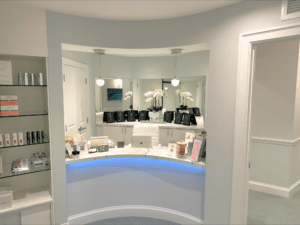Acne is a common condition that causes blocked pores, pimples, cysts, and other lesions on the skin of the face, neck, chest, back, shoulders, and upper arms. Although teenagers are often affected, adults of any age can suffer from acne. Acne is not life-threatening but can lead to physical disfigurement and emotional distress. Several effective treatment methods improve the skin’s appearance and prevent future breakouts.
Acne develops when pores become clogged, either from an overproduction of oil, a buildup of bacteria, or a shedding of dead skin cells. When oil, bacteria, or dead skin cells build up in the hair follicle, they form a soft plug that forces the follicle wall to bulge and protrude from the skin, causing a lesion. The cause of excess oil production is unknown but is believed to involve a combination of several factors, including hormones, bacteria, heredity, and, in some cases, the use of certain medications. Contrary to popular belief, chocolate, greasy foods, and dirty skin do not cause acne.
Although they can appear anywhere, symptoms of acne usually appear on the face, neck, shoulders, back, or chest. Symptoms of acne may include the following:
These symptoms can come and go and may flare up at certain times as a result of hormonal or environmental triggers such as pregnancy, menstrual periods, high levels of humidity, using oily cosmetics or hair products, and taking certain medications. Severe cases of acne may cause scarring, which can have a damaging emotional effect on the sufferer. If acne symptoms do not respond to over-the-counter treatments, or if scarring develops as the acne clears up, a dermatologist should be consulted.
Treatment methods for acne aim to reduce oil production and increase the speed of skin-cell turnover to prevent new blemishes from developing. Acne treatment also focuses on reducing inflammation to help treat current symptoms. Treatment may include a combination of topical creams and ointments, and prescription medications that include antibiotics and oral contraceptives.
Topical creams and ointments applied to the affected area are often the first form of treatment used to treat acne. Over-the-counter creams and ointments, which are used to treat mild forms of acne, may contain benzoyl peroxide, salicylic acid, or lactic acid as their active ingredient. Prescription topical treatments may contain higher concentrations of these active ingredients, as well as retinoic or azelaic acid.
Moderate cases of acne can often be treated with prescription oral antibiotics, which reduce bacteria and inflammation. They are often combined with topical treatments. Isotretinoin may be prescribed for severe cases of acne that do not respond to other treatment methods. In some cases, oral contraceptives are prescribed for women to treat moderate cases of acne.
Certain procedures may be recommended to treat scarring caused by acne. They include skin fillers, dermabrasion, microdermabrasion, and laser treatment. Many patients experience effective results from these types of treatments, which help to smooth the skin and remove the scars created by severe acne. It may take up to 8 weeks before results from treatment are apparent, and acne may get worse before getting better.
Although acne cannot always be prevented, there are certain ways to reduce the risk of breakouts. They include the following:
Patients should also avoid picking or squeezing blemishes and should be aware of anything that comes in contact with the affected area, because it may contain unwanted bacteria.
To schedule a consultation at NaturallYou or make an appointment with an Acne specialist, please call us at (203) 340-9998 or fill out an online contact form and our office will be in touch with you.


